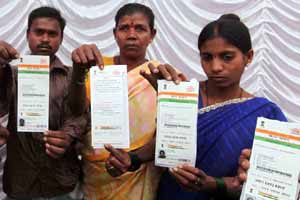With the Supreme Court on Wednesday declining to allow use of the Aadhaar card for welfare schemes other than PDS and LPG and referring a batch of petitions challenging the use of the unique identity card to a larger constitutional bench, several legal experts have opined that situation was precipitated by a faux pas on the government’s part. The government should not have taken the position that right to privacy is not a fundamental in the country and pleaded for a settlement of the issue by the apex court, they said. Many of them pointed out that recent contemporary judgments have held that right to privacy flowed from Article 21 of the Constitution and so the government could have argued that by linking Aadhaar to delivery of subsidies and other entitlements, this right would not be violated.
The government has spent Rs 5,000 crore on the Aadhaar project under which 90 crore Indians were given unique identity numbers. It was hoping to streamline the delivery mechanism for social-sector schemes and cut wasteful expenditure by using the the biometric system. In the case of disbursal of LPG subsidy in FY15, R12,500 crore was saved by Aadhaar-enabled direct transfer of subsidies to beneficiary bank accounts.
A bench headed by justice J Chelameswar on Wednesday didn’t modify its August 11 interim order as sought by the Centre, various regulatory bodies like RBI, Sebi and Trai, and several states. In that interim order, the court had directed that Aadhaar is not mandatory for availing government welfare schemes, but allowed voluntary use of the same for public distribution cooking fuel or for criminal investigation on a court’s direction. Wednesday’s ruling would effectively mean that the Aadhaar card can’t even be used for opening bank accounts and getting new phone connections.
Countering the Centre’s claim that the right to privacy doesn’t exist, legal experts said an authoritative pronouncement was needed.
Refusing to go into the merit of the case which is sub judice, senior SC lawyer and Congress spokesperson Abhishek Manu Singhvi said: “Recent contemporary judgments hold that right to privacy is definitely liable to be spelt out from Article 21.”
Singhvi added, “While I believe this is the position, the government has relied on an old decision which says to the contrary. Such a right is clearly spelt out in the contemporary context of liberal democracy with our vibrant and evolving Constitution.”
Senior lawyer Harish Salve said: “In my view, to argue that there is no right to privacy in 2015 is a constitutional heresy. However, to suggest that the Aadhaar scheme violates the right to privacy is completely untenable.” He added that the government had put all in a spot by raising the issue of whether there is a right to privacy and getting involved in a larger constitutional question.
Another senior lawyer who didn’t wish to be named also said that right to privacy can be traced to Article 21 of the Constitution, although it is not explicitly stated. “No specific right like this exists. Actually the right to life will include one’s right to maintain right to privacy. This is the reason why the question has been referred to a larger bench as there are conflicting judgments on this. As of now we can’t say who is correct — the petitioners in the case or the government. Whether the right to privacy is a fundamental right is yet to be decided by the Supreme Court,” he said.
Attorney general Mukul Rohatgi had submitted the Aadhaar card had ensured effective implementation of several social benefit schemes such as MGNREGA, distribution of foodgrains and subsidised LPG cylinders. Pointing to the wide divergence of views on privacy in the past verdicts of the apex court, Rohatgi had argued that the Constitution does not confer the right to privacy to citizens and had referred to a Supreme Court verdict delivered in the 1950s in which an eight-judge bench had held that right to privacy was not a fundamental one. According to the government, the law on the right to privacy is vague in the country and the issue needs to be settled by the apex court, which would require a conclusive consideration.



